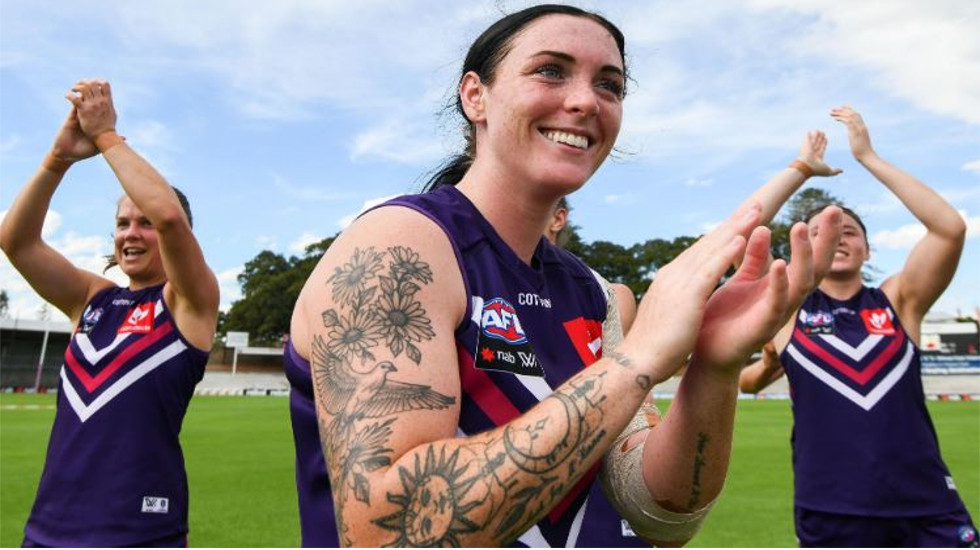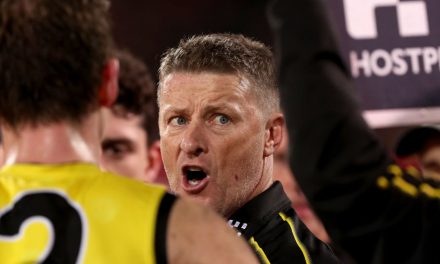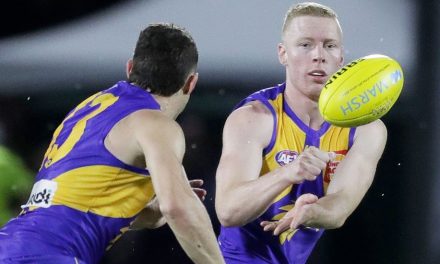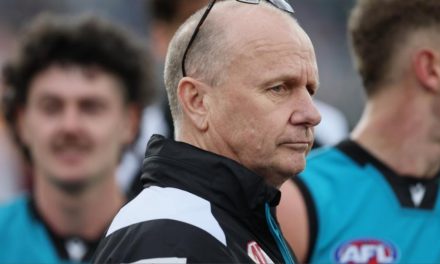Fremantle players thank the crowd for its support after crushing Gold Coast in the AFLW semi-final. Photo: GETTY IMAGES
“That was the season that was.”
Football fans of certain ages will recall the famous words delivered by Bruce McAvaney as the title of Channel Seven’s much-loved ‘90s season review program.
It was rather clumsily named, really. But we’ll borrow the line anyway and tweak it a touch as the dust settles on the 2020 AFLW “season that nearly was”.
What a pity we didn’t get to witness the crescendo. The top four sides had played entertaining football over seven weeks and would have given us something to savour at the pointy end.
Looking back on it now, one thing is clear. Gillon McLachlan and the AFL Commission made the correct call in deciding not to crown an AFLW premier when they cancelled the season.
The decision came despite McLachlan admitting “there was a leader there” in discussions about which club, if any, should be handed the flag.
It’s safe to assume he meant Fremantle, which sat pretty at 6-0 when the coronavirus kicked in and meant the season was reworked, moving straight into an expanded eight-team finals knockout.
The Dockers then smashed Gold Coast by a record margin in their semi-final at Fremantle Oval.
Yet a quirk in the compromised fixture meant they had not played Conference B rivals Carlton and Melbourne to that point, and both of those teams, as well as Collingwood, could still have leapfrogged the WA side into top spot.
Only one of Fremantle’s six wins came against a team that sat in the top three on its conference ladder when the home-and-away season was cut short.
That’s not to take away from the Dockers’ achievements. Not by any means. You can only beat what’s in front of you, as they say.
But those facts do diminish any claims to Fremantle being a team so dominant that it simply had to be awarded the premiership when a total of four clubs were still in contention.
North Melbourne was widely considered the flag favourite, with six wins from seven matches, and the Blues and Demons would rightly have fancied their chances of giving the grand final a shake.
But we digress. A far more important question lies in wait.
As the flow-on effects of the global coronavirus outbreak ravage the AFL, where does AFLW go from here?
Mainstream media has been noticeably quiet on the future prospects of a competition that has made a huge splash on the Australian sporting scene in recent years.
Behind the scenes, however, there are genuine concerns about what sort of damage the financial firestorm engulfing the game across all levels will do to the elite women’s competition.
The AFL and its clubs have stood down roughly 80 per cent of their staff and there is no telling how many will learn in the months ahead that they no longer have jobs.
Football departments are being slashed, with the league and clubs taking massive hits to their revenue streams.
There are no fixtures to sell to broadcasters, none for paying supporters to attend and none to use as a platform for advertisers.
Clubs, some of them well over a century old, are facing an existential crisis unlike any other they’ve seen before.
With that in mind, will debt-ridden St Kilda and Gold Coast be able to support their women’s programs beyond this year? What about other clubs?
Questions also abound over what sort of money, if any, will be available for female players next year after the men agreed to a significant pay cut.
And you can forget about further expansion in the women’s competition any time in the foreseeable future.
Will the AFL even make sure AFLW survives?
It would be a tough political sell if the AFL was to cast aside the women’s competition or put it on hold going into 2021 and also resume paying its male stars big money.
You’d like to say it “surely” wouldn’t reach that point. But it isn’t too alarmist to say we can’t really be “sure” about much in these uncertain times.











